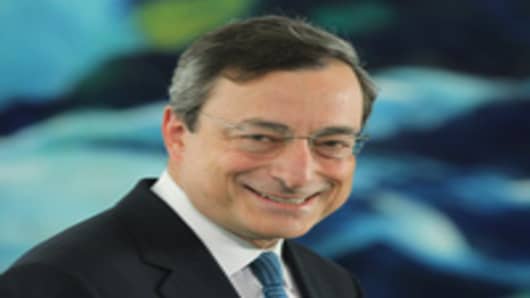And promptly, there were those out there in ECB-watcher-land who swiftly concluded that the "Italian" was more pragmatic, more of a "dove" than the Frenchman with his almost Teutonic stubbornness in defending what at times sounded eerily like the old Bundesbank.
I for one was not so hasty. I tell you why: Draghi is "my" third ECB president (after Wim Duisenberg and Jean-Claude Trichet); and - for a warm up - I had previously lived and worked through three Bundesbankers. And, you know what? The hasty conclusions were always the same.
A Social Democrat running the "Buba" - like Carl-Otto Pöhl - was meant to work better for an SPD Chancellor and promote lower interest rates and ample liquidity injections. A Conservative - such as Tietmeyer - was sure to help a CDU chancellor.
Guess what? - Never worked. Ne-ver. Three times a German Chancellor made the mistake of attending a Bundesbank council meeting and asking - not quite demanding - a rate cut - Adenauer, Schmidt and Kohl. Always a couple of decades apart. Three times the respective chancellors did not get it.
Helmut Kohl was the last in that line. The last to make that particular mistake. His successors, Gerhard Schröder and now Angela Merkel, never were foolhardy enough to ask the Buba´s "successor", the ECB, for anything at all.
Is the Buba experience relevant to today´s personalities and politics at the ECB? Absolutely. Market watchers, journalists and self-declared ECB experts of all ilk have fostered the long-cherished (and equally long misguided) view that ECB council members walk into the meetings waving the flag of their respective countries. They don´t.
There are, of course, pronounced differences of opinions, often entrenched in different economic cultures. The Northern European, shall we say the old "Deutschmark" bloc of countries with a more stability-oriented, anti-inflation policy and the Southern Europeans with a more spend-yourself-out-of-trouble approach to fiscal policy.
ECB Independence
But the French ex-government official Trichet turned out to be a more staunch defender of both ECB independence (of political pressure) and inflation-battling monetary policy than any Bundesbanker could have ever been. That even Trichet had to command a few very painful retreats - such as the Bund purchasing program or rate cuts at a time when he really would have rather raised them - does not change that.
I´ve talked to many an ECB councilor over the years and they all tell me the same story: there is a qualified discussion about the pros and cons of a monetary policy strategy in the meetings, an assessment of the available data and then it´s up to everybody to make up their own mind.
"This whole discussion about hawks and doves, about this camp or that camp is melodramatic and pointless", Ewald Nowotny, outspoken Austrian central bank governor, stressed when answering such question. "We have a debate and then we decide to the best of our knowledge. We don´t make policies for Germany or Austria or Greece, but for the whole euro area."
So has the change at the helm from Trichet to Draghi really made a difference to ECB policy? "Of course, everybody has his own style", points out Erki Liikanen, veteran ECB governor from Finland. "All the persons are different, but there’s a very strong, basic, shared history – a legacy there. The ECB has delivered price stability in a way that is perhaps more impressive than for any other central banks. I’m sure that Mario Draghi will stick to that."
Point taken. At the end of the day it might just be as it was with the string of Bundesbankers I have had the opportunity to accompany on their monetary policy course: the packaging might change, but the content remains pretty much the same.
And then - the ECB is still a central bank in the making, not a venerable old lady like the Bank of England. "Miz Europa" still has to find HER style, and as ECB watchers we shall do well to allow for that without always declaring that the ECB has abandoned its principles.



